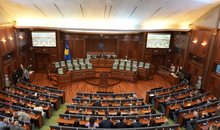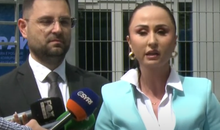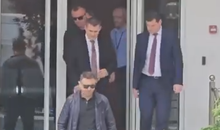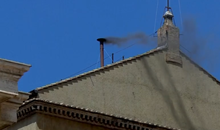
 Flash News
Flash News
The body of a 29-year-old man in Klos is found after 6 days
Arrested a few meters from SPAK, the Special Prosecution seeks 17 years in prison for the drug 'boss'
Giro D'Italia starts today, here are the road axes that will be blocked in Tirana from 13:00-18:00
Who is the new Pope?
Pope Leo XIV greets the faithful for the first time in St. Peter's Square

Alfred Lela
Taulant Balla will be the fifth interior minister of Edi Rama in 10 years of power and in the third governing mandate. No one can say for sure whether he will complete this term or not. Rama's governments have been uncertain about interior ministers and convalescent for experimental ministers, a new type of political representation such as Gent Cakaj or Bora Muzhaqi, etc., that the prime minister has brought to the cabinet to fulfill his whims and to detoxify his government as much as he could.
As for the Ministers of the Interior, who are charged with the job of controlling the villains but have often become such themselves, most of them have gone under as spoilers of the government's and Rama's propaganda, and not due to the impossibility of the fight against crime, failure to convey the government's philosophy concerning order and security, etc.
In this sense, the question that can be asked is not: why doesn't Rama have luck with the Interior's ministers, but why don't they have luck with Rama?
The answer, I think, is simple. Rama does not see and does not charge them with the heavy and noble work of the guard of order, security, and public interest, but as sandpaper that smooths the cracks of public relations.
For Rama, the uniform, the lack of a belly, the stars of the fallen on the wall of the Ministry of Interior, etc., are more important than police corruption, community policing, and public trust. Even the latter, part of the PR operation, is gained by simulating, not working.
For Rama, it has been important that the Ministers of the Interior are passionate against the opposition, such as Sandër Leshaj, or a blind force against the building of the National Theater and its defenders.
For those who directly threaten public security, the philosophy of the SP government is summed up in the phrase of the Prime Minister 'May they bring each other demise.'
However, this is not the most significant obstacle the prime minister has thrown at the feet of those he designated interior ministers. Such a functionary is impossible to act or articulate as long as the state and the apparatus of violence, which it is a part, does not have statist (state) but political (power) goals.
In Fushë Krujë, e.g., not the Minister of the Interior who failed, but his boss Rama and his successor in office, Taulant Balla. If Rama licensed Rrahman Rraja and others like him for the umpteenth time, which later became the 'Rraja phenomenon,' Balla ensured that the phenomenon was not harmed but enforced in the area of Kruja unimpeded. The case of the Fushë-Kruja Commissariat, and the intervention of MP Balla, which led to the exiling of the police officer, Nuhu, clearly shows this.
So, in the final, Rraja's resignation, Çuçi's dismissal, and Balla's appointment are internal and normal relations of the Socialist Party government. As people say, 'What you see is what you get.'
As such, the case does not show the crisis of governance but its absence. Going from crisis to crisis, this type of government has canceled all crises and has become the crisis itself.
In this sense, the interior ministers have no luck with Rama, nor will they.
Latest news


Electoral flight to Vlora
2025-05-09 13:18:04

IdentiTek offices open on Saturdays
2025-05-09 13:03:13
Will artificial intelligence help us talk to animals?
2025-05-09 12:55:58



Rama's fourth act: between Brussels and the Mafia
2025-05-09 12:12:47
The body of a 29-year-old man in Klos is found after 6 days
2025-05-09 12:01:27
Berisha: After May 12, this opposition will become the majority in Albania
2025-05-09 11:52:37
Leo XIV celebrates his first Mass as Pope
2025-05-09 11:42:34

Spaho denounces: SP candidate in Pogradec gives 100 thousand lek for the vote
2025-05-09 11:27:26
Mustafaj: Proud of the worthy campaign of the DP
2025-05-09 11:22:20
Constitution fails again, Kosovo still without a new Assembly
2025-05-09 11:06:55





"Votes have no price", the US embassy in Tirana 'slaps' Rama
2025-05-09 10:06:49

Two young men arrested for supplying criminal groups with firearms
2025-05-09 09:45:19







Foreign exchange/ How much foreign currencies are bought and sold today
2025-05-09 08:19:18
The gift that Berisha gave to Rama 'live'
2025-05-09 08:13:51
3 signs that show you are spiritually protected
2025-05-09 08:05:39

Bars can't hold back anymore, start increasing coffee prices, 4.7% more in April
2025-05-09 07:46:49

Horoscope, what do the stars have in store for you today?
2025-05-09 07:22:06
Unstable weather, afternoon brings rain
2025-05-09 07:01:29
Morning Post/ In 2 lines: What mattered yesterday in Albania
2025-05-09 06:45:46

How did LaCivita change the DP campaign? Berisha: He studied the opponent
2025-05-08 22:49:51

David defeats Goliath
2025-05-08 22:15:50

Journalist: There are SPAK infiltrators in party headquarters
2025-05-08 21:55:15
Who is the new Pope?
2025-05-08 21:48:13
Berisha finally reveals when he will retire from politics
2025-05-08 21:33:46


LaCivita in Lezha: Albanians will fire Edi Rama from his job
2025-05-08 21:11:20


Berisha: LaCivita chose us because he believes in Reagan's program
2025-05-08 20:48:40
He rejected America to serve Pogradec, Genti Çela tells about life in "Elevate"
2025-05-08 20:26:28




Pope Leo XIV greets the faithful for the first time in St. Peter's Square
2025-05-08 19:29:33




Photo session with LaCivitta in Tirana: For Great Albania
2025-05-08 18:40:18
Source: DASH decision a personal victory for Berisha
2025-05-08 18:30:10
Take off those crazy glasses and see where you've taken him?
2025-05-08 18:02:47
LDK files criminal charges against members of the incumbent Government
2025-05-08 18:02:00







BIRN analysis: Tirana, the determining district for the future majority
2025-05-08 16:04:03




Chris LaCivita's contract with the DP, Berisha: 100% correct and clean
2025-05-08 15:11:11

"These are the peak days", Berisha reveals when he will travel to the USA
2025-05-08 14:45:25


Endless boxes with filled-in ballots, DP demands separation of votes from Greece
2025-05-08 14:11:12


Photo/ Who are the 3 associates of Talo Çela arrested in Dubai?
2025-05-08 13:37:09

Hetimi për krimet zgjedhore, Altin Dumani zbarkon në Prokurorinë e Shkodrës
2025-05-08 13:06:21
DASH paves the way for Berisha, Alizoti: Great news on the eve of Great Albania!
2025-05-08 13:03:48

"Freedom works", DP welcomes the US position
2025-05-08 12:48:07

Black smoke rises from the Sistine Chapel, the Vatican still without a Pope
2025-05-08 12:26:18



